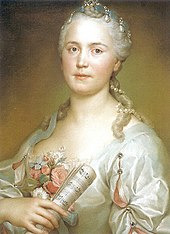Regina Mingotti

Regina Mingotti , née Regina Valentini (born February 6, 1722 in Naples , † October 1, 1808 in Neuburg an der Donau ) was an Austrian-Italian opera singer (soprano). In the libretti of the time she is also often performed with the names Caterina Mingotti or Catharina Regina Mingotti .
Life
Mingotti was born in Naples as the daughter of an Austrian officer. She grew up in an Ursuline monastery in Graz , where she received her first singing lessons from the abbess. In 1747 she married the impresario Pietro Mingotti, with whose opera company she came to Dresden that same year . The troupe played in a wooden opera house built by Angelo Mingotti, a brother of Pietro, in 1746 on the grounds of the Zwinger , which burned down in 1748.
Mingotti was hired for the royal opera in 1747 . Christoph Willibald Gluck had come to Dresden with her , whose opera La nozze d'Ercole e d'Ebe was performed by the Mingotti troupe on the Pillnitz garden stage on the occasion of the wedding of Friedrich Christian of Saxony with Maria Antonia Walpurgis . Mingotti sang the part of Hercules. Mingotti, who received singing lessons from Nicola Antonio Porpora in 1748 , was at the time the successor to the Dresden prima donna Faustina Bordoni . Although she was only hired as the second singer for the time being, bitter disputes arose between the two women within a very short time, about which information is given in letters from Pietro Metastasio and Johann Georg Pisendel . The dispute was not settled until 1750, as Mingotti was hired to Naples for a year. After Faustina Bordoni left the stage in 1751, Regina Mingotti was her successor in Dresden as prima donna.
Mingotti left Dresden in 1752 and went from there to Madrid, where the famous castrato Farinelli acted as director of the opera and in charge of courtly entertainment. He is said to have been so enthusiastic about Mingotti's voice that from now on he did not allow her to appear in public, but limited these appearances to evening concerts in front of the melancholy King of Spain. Because of this restriction, Mingotti traveled to Paris in 1754, then to London and then became involved in various Italian cities. Ten years later - in 1763 - she retired from the stage. After staying in Munich, she lived with her son Samuel Buckingham in Neuburg an der Donau, where she died as a "widowed Royal Saxon Commerce Councilor" in the house on Amalienstraße A 25.
literature
- Moritz Fürstenau : On the history of music and theater at the court of the electors of Saxony and kings of Poland Friedrich August I. (August II.) And Friedrich August II. (August III.) . Rudolf Kuntze's publishing house, Dresden 1862, p. 251 ff . ( Copy in Google Book Search).
- State capital Dresden (ed.): Women in Dresden. Documents, stories, portraits . Saxon printing and publishing house, Dresden 1994, p. 42 f.
- Felix Joseph Lipowsky, Baierisches Musik-Lexikon , p.212ff
- Michael Burden, Regina Mingotti: Diva and Impresario at the King's Theater, London , Routledge, 2017, ISBN 135155171X
Web links
- Joseph Kürschner : Mingotti, Regina . In: Allgemeine Deutsche Biographie (ADB). Volume 21, Duncker & Humblot, Leipzig 1885, p. 767.
Individual evidence
- ↑ At the first joint appearance of the two singers came on July 18, 1748 as the Opera House at the Zwinger, the dramma comico pastoral Filandro of Nicola Porpora came to the performance. See Fürstenau 1862, p. 250
- ^ A b Paul Scudo: Regina Mingotti. In: Süddeutsche Musik-Zeitung. Volume 12: No. 52 (December 28, 1863): pp. 205–206. Copy in Google Book Search
- ↑ Most important moments in life of the royal. Bavarian civil and military servants of this century, Volume 4, p.25
| personal data | |
|---|---|
| SURNAME | Mingotti, Regina |
| ALTERNATIVE NAMES | Valentini, Regina (maiden name); Mingotti, Caterina; Mingotti, Catharina Regina (full name) |
| BRIEF DESCRIPTION | Austrian-Italian opera singer (soprano) |
| DATE OF BIRTH | February 6, 1722 |
| PLACE OF BIRTH | Naples |
| DATE OF DEATH | October 1, 1808 |
| Place of death | Neuburg on the Danube |

